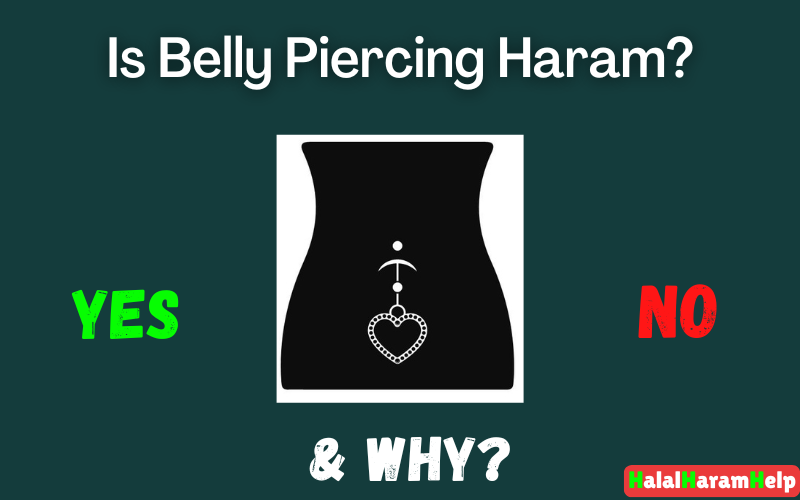Have you ever wondered if getting a belly piercing is allowed in Islam? Or perhaps you’ve heard different opinions and are unsure what the faith says about it?
Belly piercings have become a popular trend, but what does Islam teach about modifying the body in this way?
Is it considered a form of self-expression, or does it go against the principles of modesty and the sanctity of Allah’s creation?
These are questions many Muslims ask, especially at a time when body modifications are more common than ever. Let’s dive into the Islamic perspective on this controversial topic.

Is Belly Piercing Haram?
Yes, belly piercing is considered haram in Islam. It goes against Islamic teachings, as it involves altering the natural form of the body that Allah has created.
While Islam permits certain types of piercings, such as those on the ears or nose for women, belly piercings fall under the category of body modifications that are prohibited due to their permanent nature, potential health risks, and conflict with the principles of modesty.
Let’s explore why belly piercing is deemed haram and what Islamic scholars say about it.
Why Is Belly Piercing Haram?
1. Alteration of Allah’s Creation
Islam prohibits any unnecessary changes to the human body. The Quran and Hadith repeatedly emphasize the importance of preserving the natural state that Allah has created. Belly piercing is considered a form of tampering with Allah’s creation, which is explicitly forbidden.
The Prophet Muhammad (PBUH) said:
“Allah has cursed the one who makes tattoos and the one who gets them done.” (Sahih Al-Bukhari)
Although this hadith primarily refers to tattoos, it applies to other forms of body modification, like belly piercings, as they involve permanent changes to the body.
2. Permanent Changes to the Body
One key reason why Islamic scholars oppose belly piercings is the permanence of the act.
Unlike ear or nose piercings, which are small and culturally accepted, a belly piercing leaves a mark and alters the skin’s structure in a way that cannot fully return to its original state.
This is considered altering the fitnah (natural disposition), which Islam strictly discourages.
3. Violation of Modesty
Islam emphasizes modesty, especially for women. Belly piercings are often associated with exposing the midsection, which contradicts Islamic teachings about dressing modestly and covering the awrah (parts of the body that must remain concealed).
The act of decorating the belly in this way is seen as a form of self-adornment that does not align with the principles of humility and modesty that are central to Islamic values.
4. Health Risks and Harm to the Body
Another reason belly piercings are haram is the potential harm they can cause. Islam prohibits actions that harm the body, as it is considered a trust from Allah that must be cared for. The Quran says:
“And do not throw [yourselves] with your own hands into destruction.” (Surah Al-Baqarah: 2:195)
Belly piercings can lead to several health risks, including:
- Pain and swelling.
- Risk of infection, particularly in the navel area, which is prone to bacterial growth.
- Scarring and permanent damage to the skin.
- Potential complications like nerve damage if the procedure is not done correctly.
These risks further reinforce the prohibition of belly piercings in Islam.
You might also like to know is nose piercing haram.
Why Are Ear And Nose Piercings Allowed?
While belly piercings are haram, ear, and nose piercings are considered permissible for women in Islam.
This is because such piercings were culturally accepted during the time of the Prophet Muhammad (PBUH) and were seen as enhancing a woman’s beauty modestly and respectfully.
Additionally, ear and nose piercings do not cause significant or permanent bodily alterations. They are also viewed as harmless and culturally appropriate forms of adornment, provided they align with Islamic guidelines of modesty.
What To Do If You’ve Already Pierced Your Belly?
If you have already pierced your belly, it’s not too late to rectify the situation and seek forgiveness. Here’s what you can do:
1. Remove The Piercing
The first step is to take out the piercing and allow the area to heal naturally. By removing it, you are showing your intention to stop the prohibited action.
2. Repent And Seek Forgiveness
Turn to Allah in sincere repentance and ask for forgiveness. The Quran emphasizes the importance of seeking Allah’s mercy:
“Indeed, Allah loves those who are constantly repentant and loves those who purify themselves.” (Surah Al-Baqarah: 2:222)
3. Avoid Repeating the Action
Make a conscious effort to avoid engaging in similar haram activities in the future. Reflect on the teachings of Islam and prioritize your faith over temporary trends or desires.
4. Practice Modesty
Ensure that your clothing covers the area of the belly piercing and aligns with Islamic guidelines of modesty.
Also see is it haram to donate organs.
How To Avoid Belly Piercing?
If you are considering getting a belly piercing, it’s essential to understand why it’s prohibited in Islam and resist the temptation. Here are some practical tips:
- Educate Yourself: Learn more about what is considered halal and haram in Islam to make informed decisions.
- Seek Advice: Speak to knowledgeable Islamic scholars for guidance if you’re unsure about body modifications.
- Surround Yourself with Supportive Friends: Avoid peer pressure by spending time with friends who respect and encourage adherence to Islamic values.
- Focus on Spiritual Growth: Strengthen your connection with Allah through prayer, charity, and other acts of worship to avoid being influenced by fleeting trends.
Also see is it haram to donate blood.
Conclusion
In Islam, belly piercing is considered haram due to its permanent alteration of Allah’s creation, violation of modesty, and associated health risks.
While Islam allows certain forms of adornment, such as ear and nose piercings, belly piercings do not align with the teachings of modesty, dignity, and respect for the human body.
If you’ve already pierced your belly, it’s important to repent, remove the piercing, and strive to align your actions with Islamic principles.
Remember, the body is a trust from Allah, and preserving its natural state is a sign of gratitude and obedience to Him.
In the end, choosing to follow Islamic teachings will bring peace, fulfillment, and the blessings of Allah.


